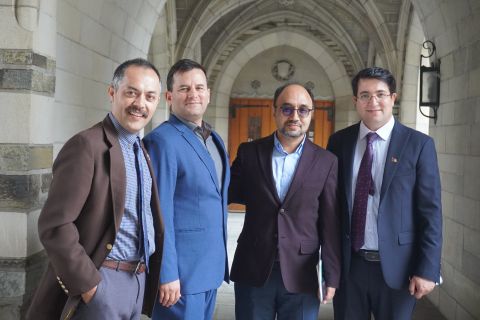Experts Envision Afghanistan’s Future

Next Generation’s Initiative Conference
“If you block peaceful politics, then you make room for unpeaceful politics,” said a presenter at the Sept. 9 conference at Cornell.
By Phoebe Wagner
The Next Generation's Initiative: Learning from the Past to Build the Future of Afghanistan – a conference held on Cornell campus on Saturday, Sept. 9 – brought together Afghan scholars and experts in politics and law to analyze Afghanistan’s recent past for clues about how to build a brighter future. The event was hosted by the South Asia Program (SAP), part of the Mario Einaudi Center for International Studies, and the Clarke Initiative for Law and Development in the Middle East and North Africa at Cornell Law School.
The nine presenters engaged in discussions about the future of Afghanistan on governance and constitutionality, the public sphere, rule of law, and public perspectives. The conference opened with a welcome from SAP visiting scholar Sharif Hozoori, an Institute of International Education Scholar Rescue Fund fellow and an expert on Afghanistan politics.
The first presenter, Farid Tookhy, a senior fellow at the Institute for Peace and Diplomacy, centered questions of how Afghans can work together to create the future of Afghanistan. Zinab Attai, a PhD student in comparative politics at Cornell, emphasized how “Afghanistan’s history is punctuated by recurrent instances of foreign intervention.”
Mirwais Balkhi, a fellow at the Wilson Center, spoke to the need to redefine Afghanistan as a nation state, and to “develop a country for ourselves.” How the new generation addresses this issue is crucial, he said. When Afghans come together and learn about the history of the country and talk about a shared destiny for their country, people can envision a homeland for themselves.
Another major issue is the system of governance, panelists argued. Anything could be possible in the current situation – even the collapse of the country or the fragmentation of Afghanistan into different local zones – which Afghanistan as a nation state could not easily recover from in the future.
A global development undergraduate asked, “How did the executive branch influence the legislative branch to exercise its power? Was it because of a constitutional flaw, or because the constitution wasn’t used at all?”
Shamshad Pasarlay of University of Chicago Law School responded, “Constitutions alone cannot be blamed on the failure of a state.” In the U.S., he said, it’s a document that works – even though it’s imperfect. It can be used as a focal point in the executive branch and legal system.
“If you block peaceful politics, he continued, “then you make room for unpeaceful politics.”
By creating a space for thoughtful discussions, there was room for respectful disagreement. Participants engaged with and challenged presenters, and the panels’ common themes created a rich dialogue. The discussion demonstrated the diversity of thought that is needed for envisioning new futures and generating change.
In his closing remarks, Tawab Danish of Cornell Law highlighted the conference’s breadth of topics, from nation-building to identity. When discussing Afghanistan and Afghans’ rights, he said, it’s important to have the people suggesting solutions to be of the place – and this insider perspective was part of what made the day’s conversation so productive.
“International scholars have often written about and presented on Afghanistan, but Afghan scholars know the country though their direct lived experiences,” said Danish.
The conference was cosponsored by the Einaudi Center's Comparative Muslim Societies Program and Reppy Institute for Peace and Conflict Studies and the Department of Near Eastern Studies, Department of Government, and Religious Studies Program in the College of Arts and Sciences.
Phoebe Wagner is an MPS student in the Department of Global Development (CALS) and a FLAS fellow in Hindi at the South Asia Program.

